6 Weird Science Experiments
With just a few items nearly everyone can find at home, you can do amazing science experiments. Want to make a lava lamp? Just grab a little cooking oil, water and salt. How about writing with secret “ink” on a mirror? All it takes is dishwashing detergent, water and a cotton swab. Get set for fun and learn a little science?

Note: Be sure to ask for a parent’s help and permission before starting any experiment.
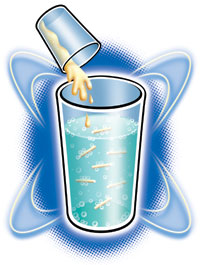
SWIMMING SPAGHETTI
Make spaghetti do tricks with this fun and fizzy experiment.
What You Need:
- uncooked spaghetti
- 1 cup of water
- 2 teaspoons of baking soda
- 5 teaspoons of vinegar
- tall clear glass
What You Do:
Put water and baking soda in the glass. Stir until the baking soda is dissolved. Break spaghetti into 1-inch pieces. Put about 6 pieces in the glass. They will sink to the bottom. Add vinegar to the mixture in the glass. Observe what happens to the pieces of spaghetti. Add more vinegar as the action starts to slow down.
What’s Going On:
When baking soda and vinegar are mixed together, a chemical reaction occurs. It produces a gas called carbon dioxide, which forms lots of bubbles on top of the mixture and smaller bubbles at the bottom of the glass. These little bubbles stick to the spaghetti and make it float to the surface, just as you do when you sit on a swimming pool noodle! When the spaghetti reaches the surface, the bubbles pop and the spaghetti sinks to the bottom.

WRITE A SECRET MESSAGE
Write an invisible message on a mirror using a soapy solution and a cotton swab. The secret message will appear only in a foggy room.
What You Need:
- liquid dishwashing detergent
- cup of water
- a few cotton swabs
- hand mirror or bathroom mirror
What You Do:
Place a few drops of dishwashing detergent into the cup of water. stir to mix well. This is your secret message “ink”.
Dip a cotton swab into the soapy solution. Write a short message on the mirror. When the liquid dries, the message will be invisible. (If not, use a little less of the solution.)
When you take a hot shower or bath, do not get the mirror wet, but get the mirror close enough to the steam from the water so that it gets fogged up. Close the door so the steam stays in the bathroom.
Observe what happens. Can you read the message?
More fun: Write a message and wait until someone else takes a shower or bath. See how quickly they discover your secret.
What’s Going On :
The steam on the mirror is made up of water molecules. These tiny drops of water stick together on the mirror because of a force called surface tension. The liquid dishwashing detergent breaks the surface tension of the water. Wherever there is detergent, the water molecules are unable to form into droplets. The words written with the soapy solution stand out clearly against the foggy background of the mirror.
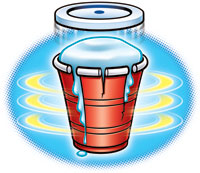
THE POWER OF ICE
Why do people put covers on their outside faucets in the winter? Why isn’t it a good idea to leave water in a garden hose during freezing temperatures? It’s the power of ice.
What You Need:
- three small plastic drinking cups, one with a lid dish or pan big enough to hold all three
- cups
- water
- freezer
What You’ll Do:
Fill all three cups with as much water as possible without overflowing. Put the lid on one.
Set all three cups on the dish and place in the freezer overnight.
Check to see what happened the next morning. Did the water stay the same size after it became ice?
Leave the frozen items in the freezer for a few days. Did you notice any changes?
What’s Going On:
When water freezes, it expands. When water is left in a garden hose during freezing temperatures, the force of the ice expanding can cause the hose to break open. The same thing can happen with the water pipes in your house. If the water freezes in the pipe, it can break the pipe open.
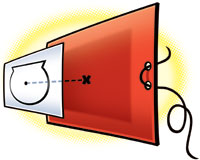
FISH IN A BOWL: MAKE A MOVIE
Fool your eyes with this experiment. Using a homemade thaumatrope (THAW-muh-troap), you can combine two pictures into a single image by quickly flipping the pictures back and forth.
What You Need:
- small piece of cardboard, about 2 inches by 3 inches
- sharpened pencil or pen to make holes in cardboard
- two pieces of string tape
- two small pieces of paper
What You Do:
Cut out a small piece of cardboard and punch holes in each corner. On both sides, write a small “X” in the center of the cardboard.
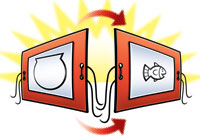 Cut out two pieces of white paper that are a little smaller than the cardboard piece. Make sure the holes will not be covered up when the paper is placed over the cardboard.
Cut out two pieces of white paper that are a little smaller than the cardboard piece. Make sure the holes will not be covered up when the paper is placed over the cardboard.
On one piece of paper, draw a fish. On the other, draw a fishbowl. Be sure to draw the fishbowl larger than the fish.
Tape the picture of the fish on one side of the cardboard, so that the fish is directly over the “X”.
Tape the fishbowl on the other making sure the bowl is centered on the “X”.
Thread one piece of string through the two holes on one side. Thread the other piece of string through the two holes on the other side.
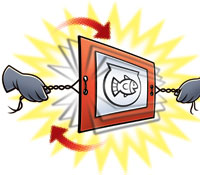 Twist the strings together on each side. Pull the strings as though you are trying to stretch a rubber band. This will make the cardboard twirl. Watch the pictures. Does it look like your fish is in the fishbowl?
Twist the strings together on each side. Pull the strings as though you are trying to stretch a rubber band. This will make the cardboard twirl. Watch the pictures. Does it look like your fish is in the fishbowl?
More fun: Draw a picture of a bird and a birdcage or anything else you can imagine!
What’s Going On:
Your eye sees the image of the fish for a short time after it is gone. By that time, the picture of the fishbowl is in sight, and you seem to see both pictures at once. The same thing happens at the movies. If you look at a piece of movie film, you’ll see that it is a series of pictures separated by black spaces. These pictures with black spaces in between are flashed on the screen so fast that your eye cannot see the individual pictures or the black spaces.
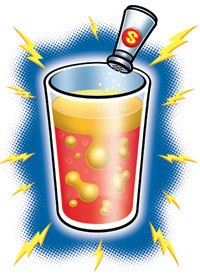
MAKE A LAVA LAMP
Here’s an easy yet amazing way to make your own “lava lamp’.
What You Need:
- cooking oil, such as vegetable oil
- cold water (no ice)
- salt water glass
- food coloring
What You Do:
Fill the glass about three-quarters full of cold water. Stir in a few drops of food coloring. Can you guess what will happen when you add oil to the water? Will they mix together or separate? Which will be on top?
Add some cooking oil until you have about a half-inch layer of oil on top of the water. Wait until the oil and water have separated into two layers before the next step.
Sprinkle salt on top of the oil. Keep adding salt to see what happens.
What’s Going On:
The oil is lighter than water, so it floats. The salt is heavier than both the oil and the water, so it sinks. As the salt passes through the oil layer, it picks up blobs of oil, which cling to the grains of salt temporarily and sink to the bottom of the glass. Then the oil breaks free from the salt and floats to the top.
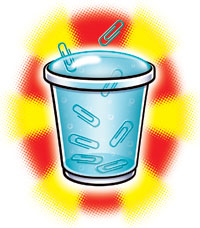
FUN WITH PAPER CLIPS
See how many paper clips it takes to make a full glass of water overflow.
What You Need:
- clear plastic cup
- 100 small metal paper clips
What You Do:
Fill the cup to the top with water.
Guess how many paper clips it will take to make the water overflow. Write down your guess.
Carefully drop one paper clip at a time into the cup. Count how many it takes to make the water overflow. Was your guess close?
Look at the cup from the side. The water is bulging upward like a balloon!
More fun: Fill the sink or a dish with water. Carefully lay a small piece of paper on top of the water. See how many paper clips you can put on top of the paper before it sinks. Try using different sizes of paper.
What’s Going On:
Drops of water stick to each other. That is why the surface of the water bulged when you added the paper clips. Scientists call this surface tension. The surface tension of the water is what held up the floating paper until the weight of the paper clips became too heavy.
cool lava lamp
I am so excited to try the lava lamp! I can’t wait!
When doing the lava lamp add lots of salt and dont use food coloring just use clear water.
science is so cool!!!!!!!!!!!!!!!!!!!!
Lava lamp. I’m going to try
awsome
I did extra salt
cool lava lamp
the lava lamp not work!
im going to try the lava lamp
the lava lamp looks awesome
i try lava lamp too.